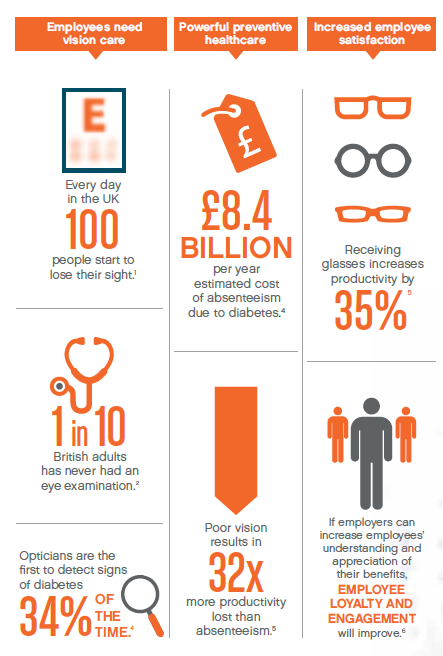Comprehensive eye care is good for people and for business, says Suzanne Starkey
WHEN it comes to personal health and wellness, we all know the importance of preventative care. We eat balanced diets and exercise often. But how many of us include regular eye examinations as part of our personal wellness?
Every day in the United Kingdom, 100 people start to lose their sight*. And according to Eyecare Trust, one in 10 British adults has never had an eye examination. We rely heavily on our sight to complete everyday tasks, to perform well in our jobs and to experience the world. Yet, we tend to neglect to safeguard this important sense with comprehensive eye coverage and regular examinations.
What do our eyes say about our health?
Often we wait to see an optician until we notice a change in our vision. The problem with waiting is that most eye problems are often silent and without obvious symptoms. By getting a regular eye examination, we are able to keep a better watch on our vision health and can prevent, or reduce problems that result in vision loss. In a comprehensive eye examination, the optician can look for eye muscle imbalance, vision disorders, and eye diseases that could potentially cause future problems.
While routine eye examinations are crucial for maintaining our eye health, vision care has applications beyond just vision correction. Because our eyes are the only place in our bodies that provide a clear view of blood vessels, arteries and cranial nerves, comprehensive eye examinations can tell a lot about overall health. They also detect early signs of health conditions often before symptoms are apparent.
A comprehensive eye examination, such as those offered by a vision care provider can often detect the first signs of chronic conditions**, such as:
- Diabetes in 34% of cases
- Hypertension in 39% of cases
- High cholesterol in 62% of cases
What is the economic rationale for employers regarding vision care?
Vision care is not only a crucial element of personal wellness and preventative care, for employers it’s also a low-cost, high-value benefit that can be offered at relatively low to no cost to employees. When employees utilise vision plans to manage their vision and overall health, employers also reap the benefits.
Improved productivity
One way that vision coverage benefits the employer is by increasing employee productivity. According to Vision Council*** poor vision results in 32 times more productivity lost than from absenteeism alone. And individuals who receive glasses are able to increase their productivity by 35 percent over a two year period.
Reduced medical costs
By providing early detection of vision problems and other chronic health conditions, regular eye examinations play a vital role in disease management. A recent study conducted by Human Capital Management Services Group (HCMS Group) found a 145 percent ROI on initial dollar investment due to early detection of chronic diseases with reduced employer medical costs, fewer hospital admissions and ER visits, and less employee out-of-office time.
Individuals and employers alike can easily see the value of personal wellness, yet vision care remains as low hanging fruit. As a key indicator for early detection of vision and overall health conditions, routine eye examinations and comprehensive vision coverage is a crucial component of an employee wellness programme that truly pays for itself.
This article appeared in the Autumn/Winter edition of our risk management magazine, Cardinus Connect. Download it here.
Like to know more about vision care and ergonomic risk? Email us at [email protected] for more information.
*RNIB, “Save Your Sight: Spot the Signs,” c2016.
**Study commissioned by VSP and conducted by HCMS from November to December 2012. Study sample consisted of randomly selected, geographically representative shops with nearly 850 private-practice independent optometrist locations and nearly 450 retail chain locations.
***Vision Council, 2008. “Vision Care: Focusing on the Workplace Benefit.”


